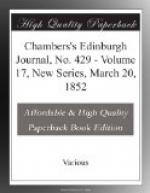’Deeply affected, he inquired of the poor man the names of his creditors, the amount of their respective claims, and the peculiar circumstances which had led to the contraction of each liability. Having ascertained these particulars, and perfectly satisfied himself that the man had not forgotten the precept of the society of which he was a member—“Not to contract debt without at least a reasonable prospect of discharging it”—he asked him whether freedom from these liabilities would restore to him peace of mind. The question was answered by a sort of sickly smile, which seemed to indicate a perfect despair of such a consummation. “Well, come,” said the master, “I don’t think things are quite so bad, ——, as they appear to be to you. See here, my poor fellow, you owe —— pounds: it’s a very large sum for a man like you, to be sure; and if you had run into debt to anything like this amount through extravagance, or even thoughtlessness, I should have regarded it as an act of dishonesty on your part, and I might have felt it right to discharge you. But you are to be pitied, and not to be blamed. Cold pity alone goes for nothing, so let us see how you can be helped out of your troubles. Now, do you think your creditors, considering all the circumstances, would take one-half, and be satisfied? Here’s Dr Edwards—his bill is the heaviest; if we can get him to take one-half”——
“One-half, master!” exclaimed the poor man, “but if they would take half, where’s the money to come from? I ’arn’t got a shilling in the world but what’s coming to me Friday night; and when I take my wages now, I ’arn’t any pleasure in looking at the money, because it ’arn’t my own; it should go to pay my debts, and I’m obliged to use it to buy victuals. I think in my heart I shall ne’er be happy again.”
’Still more sensibly affected by the poor man’s manner the longer the interview lasted, my kind-hearted relative begged him not to distress himself any more; he said that a Friend of his had given him a sum that was quite equal to one-half his debts, bade him return to his work, order a horse to be put into harness as he passed through the yard, and brought round in ten minutes; and told him to be sure to make himself as happy as he could till he saw him again. He immediately drove round to every creditor the poor man had, compounded with them for their respective claims, and obtained their receipts in full discharge. On his return, the poor man’s stare of bewilderment was indescribable. He watched his master unfold the receipts one by one without uttering a syllable; and when they were put into his hand, he clutched them with a sort of convulsive grasp, but still not a word escaped him. At length he exclaimed: “But, master, where’s the money come from?”
“Never do you mind that, ——,” was the reply; “go home, and tell your wife you are out of debt; you are an independent man. I only hope the creditors have felt something of the satisfaction in forgiving you one-half your debt to them, that we know God feels in forgiving our debts to him for Christ’s sake: I have said that much to all of them.”




